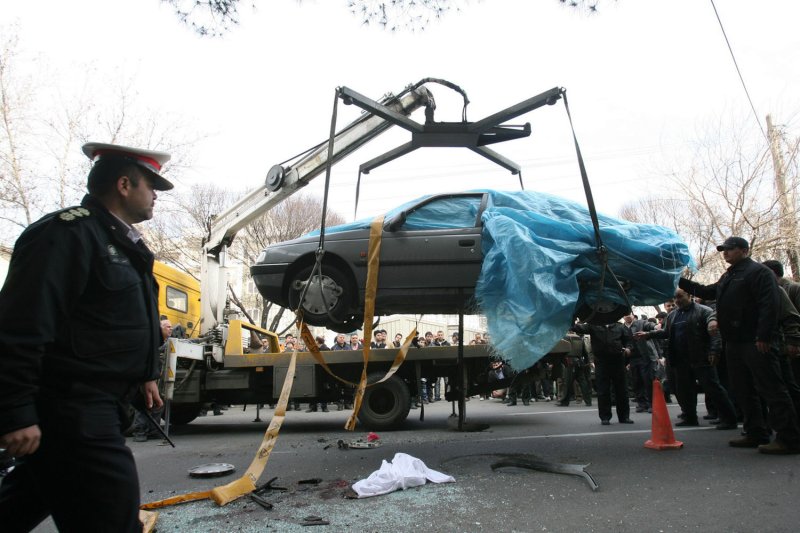1 of 2 | Iranian policemen and people stand around the blast site that killed nuclear scientist Mostafa Ahmadi Roshan in Tehran on January 11, 2012. Iran officials have compared the incident to the assassination attempts in the last two years on three other Iranian scientists who also worked on nuclear projects. UPI/Meghdad Madadi/ Fars News Agency |
License Photo
WASHINGTON, Jan. 12 (UPI) -- Adversaries appear to be conducting a covert campaign of killings, bombings and cyber-breaches against Iran's nuclear program, specialists on Iran say.
The effort, which experts say they believe is being carried out primarily by Israel, appears to have claimed another victim Wednesday, when a bomb planted on a vehicle killed a nuclear scientist in Tehran, The New York Times reported.
Iranian officials blamed both Israel and the United States for the death. U.S. officials deny having anything to do with killing scientists, although the Times said the United States is believed to be engaging in other efforts to disrupt the Iranian nuclear program.
"The United States had absolutely nothing to do with this," Tommy Vietor, a spokesman for the National Security Council, said. Secretary of State Hillary Rodham Clinton denied "any United States involvement in any kind of act of violence inside Iran."
Karim Sadjadpour, an Iran expert at the Carnegie Endowment for International Peace, said some of the scientists could have been killed by the Iranian government because they had indicated sympathy for the opposition, he said.
"I think there is reason to doubt the idea that all the hits have been carried out by Israel," Sadjadpour told the Times. "It's very puzzling that Iranian nuclear scientists, whose movements are likely carefully monitored by the state, can be executed in broad daylight, sometimes in rush-hour traffic, and their culprits never found."
Patrick Clawson, director of the Iran Security Initiative at the Washington Institute for Near East Policy, offered a more common theory, the Times said.
"I often get asked when Israel might attack Iran," Mr. Clawson said. "I say, 'Two years ago.' "
Clawson said covert actions on suspected Iranian nuclear sites were preferable to airstrikes.
"Sabotage and assassination is the way to go, if you can do it," he said. "It doesn't provoke a nationalist reaction in Iran, which could strengthen the regime. And it allows Iran to climb down if it decides the cost of pursuing a nuclear weapon is too high."















